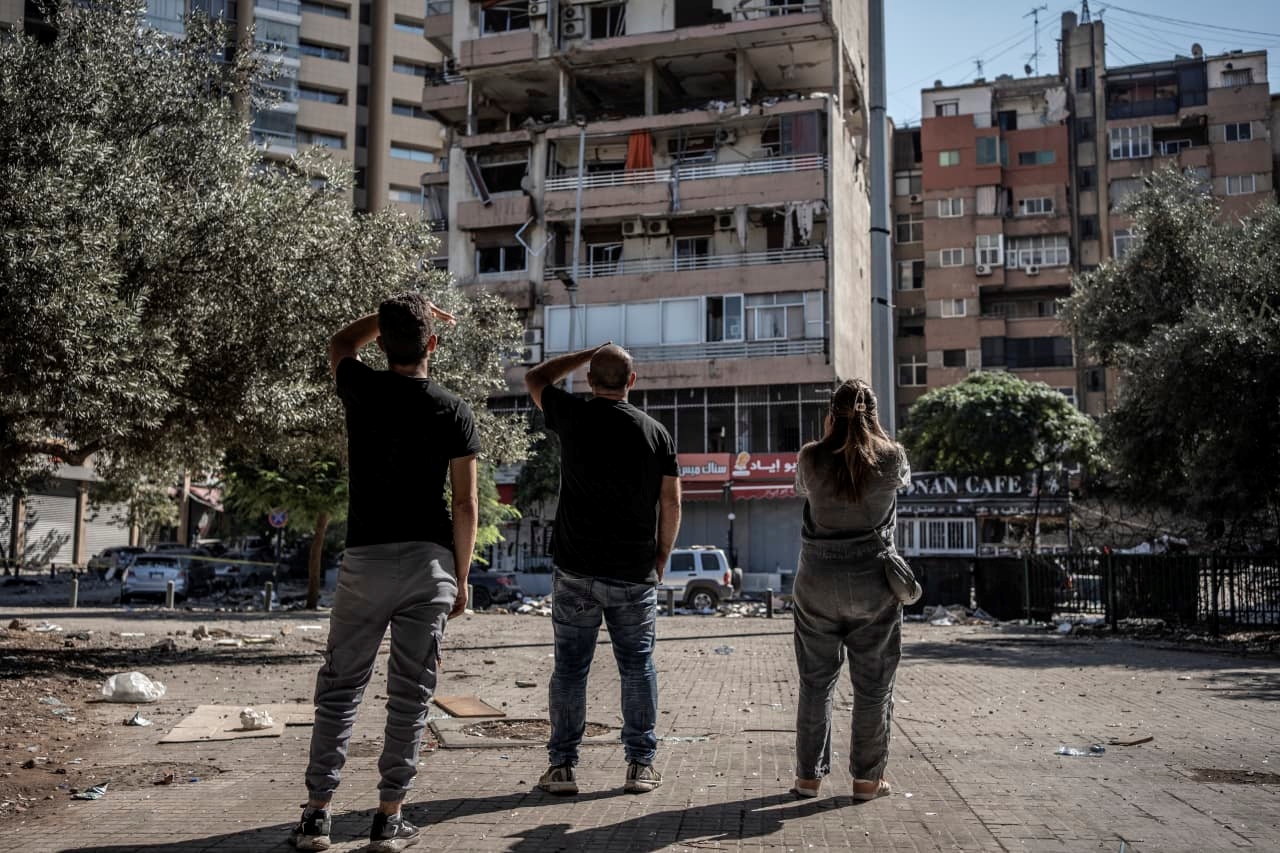Israeli special forces have been carrying out small, targeted raids into southern Lebanon, gathering intelligence and probing ahead of a possible broader ground incursion that could come as soon as this week, people familiar with the matter said.
The raids, which have included entering Hezbollah’s tunnels located along the border, have occurred recently as well as over the past months, part of the broader effort by Israel to degrade Hezbollah’s capabilities along the border dividing Israel and Lebanon, the people said. The timing of any ground action could change, the people said.
The Biden administration expects an imminent Israeli invasion of Lebanon, U.S. officials said. Much of the fighting is expected to take place along the Israeli-Lebanese border, though there is concern in Washington that the war could expand geographically and last longer than a short-term campaign.
An Israeli official said that, if there were to be a broader ground operation, it would feature “localized, limited raids against Hezbollah targets along the border with the objective of destroying the capabilities of the Radwan Forces,” the militant group’s special-operations unit. Israeli forces assess that the group is making preparations for an attack, as Hamas did before Oct. 7, including positioning clothes, weapons and other materials along the border.
The U.S. has urged Israel to seek a diplomatic solution and keep any ground operation targeted. It wasn’t immediately clear how long Israel would aim to hold territory, or whether an incursion would be more like a series of larger raids.
Amir Avivi , a former senior Israeli military official who continues to be briefed by the defense establishment, said a ground incursion by Israel is imminent and that the raids are part of the preparation.
“The IDF has made a lot of preparations for a ground incursion,” Avivi said. “Overall, this always includes special operations. This is part of the process.”
Hezbollah appears so weakened by Israeli operations—including a strike that killed the group’s leader, Hassan Nasrallah —that Israel’s dilemma would actually be how far Israel should go into Lebanon, Avivi said. When and under what terms Israel would leave remain unclear, he said.
Israeli Defense Minister Yoav Gallant , speaking to infantry and tank brigades in the north on Monday, said Israel was preparing to enter Lebanon using infantry, tanks, ships and air power.
“The elimination of Nasrallah is a very important step, but it is not the final one. We will employ all the capabilities at our disposal,” Gallant said. “We will use all the means that may be required—your forces, other forces, from the air, from the sea and on land.”
The Lebanese army on Monday ordered troops to leave the border area due to a potential Israeli ground operation, according to a senior army official who said that troops from eight army surveillance posts are being repositioned.
The Biden administration is worried about Iranian retaliation. Officials in Washington are in touch with their Israeli counterparts to prepare a defense against such an attack, which some in the administration suggest could be similar to Tehran’s April barrage of missile and drone strikes that the U.S., Israel and regional partners repelled.
In the first remarks from a senior Hezbollah official since Nasrallah was killed last week in a massive Israeli airstrike on Beirut’s southern suburbs, the group’s deputy secretary-general said the killing of him and other top military commanders hadn’t undermined the militants’ ability to fight.
“We are ready for ground engagement with the enemy if they decide to enter,” Naim Qassem said in televised remarks Monday.
A broader ground incursion would be highly provocative in the region and a further blow to a country scarred by previous invasions that ended in 2000 and 2006. Israel’s government is under pressure to create a buffer zone to stop Hezbollah attacks that have forced some 60,000 people from their homes in the north and prevent the sort of cross-border attack that Hamas led against Israel on Oct. 7, which many in the country still fear. Hezbollah has threatened for years to invade parts of northern Israel.
A recent raid occurred last week, according to officials from the U.S., Lebanon and the United Nations. The Lebanese army reported to the U.N. the presence of Israeli troops in an area between Hanita on the Israeli side and Alma El Chaab on the Lebanese side, near the Blue Line—a boundary drawn by the U.N. after Israeli forces withdrew from southern Lebanon in 2000.
One of the officials said the Israeli military told the commander of the U.N. Interim Force in Lebanon, a multinational peacekeeping force stationed in south Lebanon since 1978 to help secure the border and prevent renewed conflict, that it was conducting engineering works and eventually withdrew.
A senior Israeli official said last week that the country hoped to avoid a ground invasion. It has, however, been building up its forces in the north with the shift in focus to the fight with Hezbollah and now has more on that front than anywhere else in the country.
The U.S. and Arab countries have consistently said they want a diplomatic solution to the crisis, warning of the risk of a regional war.
The U.S. also has beefed up its forces in the region to deter countries such as Iran from getting involved and to be prepared to respond to any escalation.
The Pentagon said Sunday it would keep the USS Abraham Lincoln carrier strike group and its accompanying ships near the Red Sea. The Lincoln had been expected to leave when the USS Harry S. Truman carrier strike group arrived. The Truman will now be operating near the Mediterranean Sea. It is unusual for the U.S. to keep two carriers in the region.
A ground operation would follow two weeks of elaborate intelligence operations, targeted killings and heavy bombardments aimed at degrading the U.S.-designated terrorist group’s command and control and weapons stores. Israel conducted airstrikes on more than 2,000 targets last week, in its heaviest bombardment of Lebanon in years, the military has said.
Israel pushed its bombardments to the doorstep of Beirut over the weekend, targeting sites in the southern suburbs where Hezbollah has a heavy presence. Early Monday, it attacked in Beirut itself with an airstrike on an 11-story apartment building in Kola, a bustling intersection just north of the southern suburbs. The fifth floor of the building was gutted, with some damage to the floors above and below.
Four people were killed, including three leaders from the Popular Front for the Liberation of Palestine, the leftist armed group said.
Israel killed Hezbollah’s leader, Nasrallah, on Friday, flattening part of a neighborhood to eliminate the cleric who led the group for three decades and built it into a fearsome foe. His deputy said Monday that the group would choose a new leader soon.
The week before, thousands of pagers and walkie-talkies carried by Hezbollah members exploded virtually simultaneously, killing 37 people and injuring around 3,000. Shortly afterward, an airstrike in Beirut killed a group of more than a dozen elite military leaders.
Hezbollah began firing across the Lebanon-Israel border shortly after the Hamas-led Oct. 7 attacks on southern Israel that killed 1,200 people and sparked the war in Gaza. The two foes have traded fire almost daily since then, depopulating strips along both sides of the border and raising concerns of escalation into a wider war.
Over that period, more than 11,000 projectiles have been fired from Lebanon into Israel, according to an Israeli official. Israel in turn struck Lebanon more than 8,000 times by air, drone, missile and artillery through Sept. 20, before the latest round of heavy Israeli bombardment, according to the nonprofit Armed Conflict Location and Event Data.
Israeli forces have invaded Lebanon twice, in 1978 and 1982 during the country’s civil war, to combat the Palestine Liberation Organization, which launched raids into Israel from Lebanese territory. Troops laid siege to Beirut in 1982, then retreated to occupy a buffer zone along the border. Hezbollah emerged to oppose their presence, which finally ended in 2000 when they pulled back to within Israel’s borders.
Israel invaded again in 2006, after Hezbollah captured two Israeli soldiers and took them back into Lebanon. The war lasted about a month.
In the weeks before Israel invaded Gaza in late October, soldiers conducted small-scale raids into Gaza often lasting less than 12 hours before returning to Israel, to clear the area near the border including tunnels, according to reservists who took part in these raids and an Israeli official.



